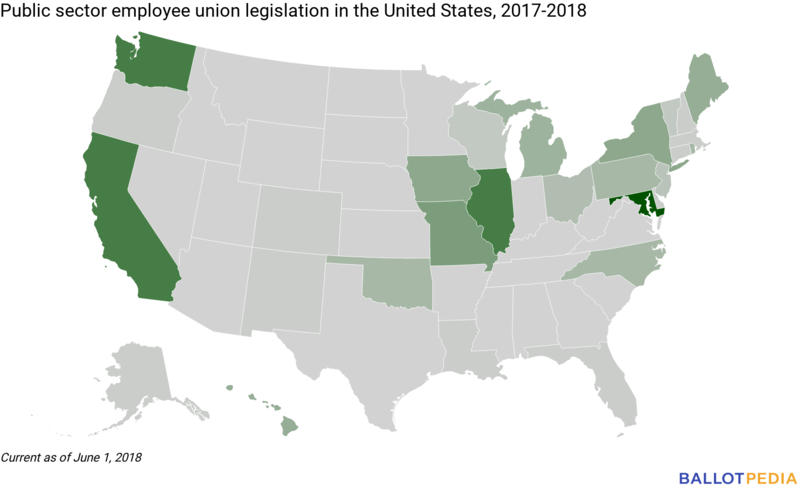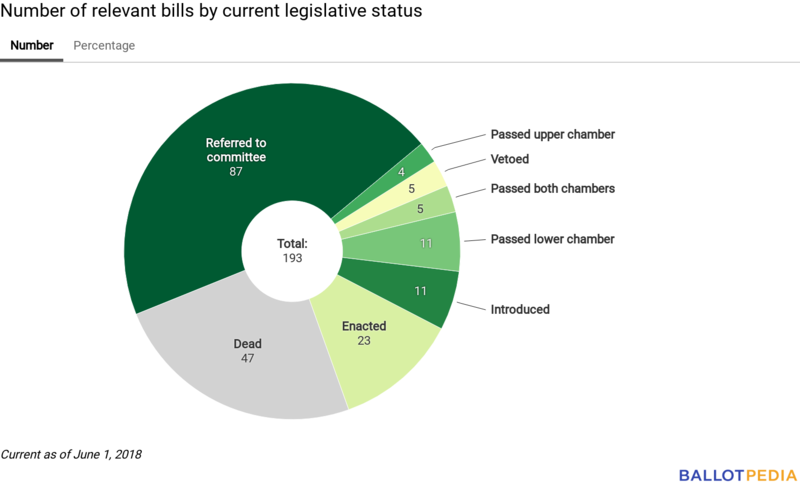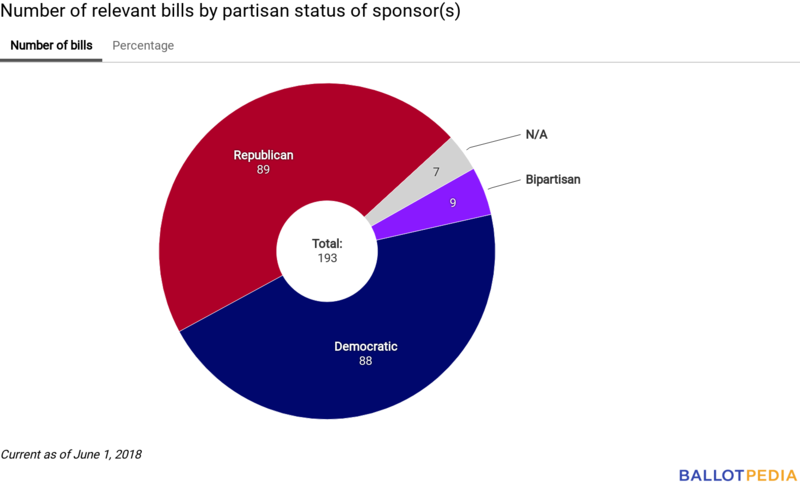Union Station: June 1, 2018
According to the Bureau of Labor Statistics, unions represented nearly 8 million public sector workers in 2017 -- 37.9 percent of the total public sector workforce. Of this total, 7.2 million were union members; the remaining employees were non-members represented by unions. Conversely, unions represented 7.3 percent of private sector workers. The high rate of public sector unionization gives those unions considerable political influence at the local, state, and federal levels.[1]
The Supreme Court of the United States is poised to issue a decision in Janus v. American Federation of State, County, and Municipal Employees (Janus v. AFSCME), a case challenging the constitutionality of public sector employee union agency fees (i.e., fees required of non-members to cover the costs of non-political union activities).
Agency fee opponents say requiring such fees violates individual worker’s First Amendment associational rights. Fee proponents argue they are necessary to support the costs associated with representing non-members.
In anticipation of this ruling, state legislatures have begun considering bills relating to public sector employee unions. In this newsletter, Ballotpedia will track those bills, highlight national legislative trends, and provide a sampling of commentary surrounding the subject.
What people are saying
In opposition to Janus:
| “ | Unions are required by law to represent and negotiate on the behalf of all workers in a bargaining unit, regardless of whether the individuals they represent are dues-paying members. This case, if decided in favor of the corporate special interests, would prevent public-sector unions from collecting fair share fees from workers they represent who choose not to join the union, which in turn makes it more difficult for working people to negotiate better wages and benefits, and the kind of working conditions that set standards for everyone.
The fact is no one is ever forced to join a union and no one is forced to pay anything to support the political activity designed to advance the rights of working people. This already is the law of the land—and this case, under the guise of freedom of speech, wouldn’t change that.[2] |
” |
| —Freedom to Join, a new website launched by the AFL-CIO in opposition to Janus | ||
In favor of Janus:
| “ | For decades, public sector workers have been forced to give up a portion of their paycheck to unions just because they picked careers as teachers, social workers, police officers or other government employees. Now, that could all change thanks to an Illinoisan named Mark Janus, and other brave Illinoisans who paved the way.
The U.S. Supreme Court is set to rule on an Illinois-based case, Janus v. AFSCME, by the end of June. If the high court rules in the favor of plaintiff Mark Janus, government employees will no longer be forced to pay union fees if they do not support the union in their workplace. Mark is a child support specialist for the state of Illinois who felt many of his union’s aims went directly against his idea of what public service is all about. While he loves his job, he and his lawyers at the Liberty Justice Center and National Right to Work Legal Defense Foundation argued he shouldn’t be forced to give money to a union just to keep working.[2] |
” |
| —Mailee Smith, in an op-ed for The State-Journal Register | ||
The big picture
Number of relevant bills by state
As of June 1, 2018, we have tracked 193 pieces of current legislation dealing with public sector employee union policy. On the map below, a darker shade of green indicates a greater number of relevant bills. Click the map for complete information.
Number of relevant bills by current legislative status
Number of relevant bills by partisan status of sponsor(s)
Recent legislative actions
Since last week, the following major legislative actions occurred:
- One bill was enacted
- Connecticut: HB05177
- Two bills cleared an upper chamber
Below is a complete list of actions taken by legislatures on relevant bills over the course of the past week. Bills are listed in alphabetical order, first by state and then by bill number. Note that some action dates may have occurred more than a week ago. This is due to the fact that state-specific legislative tracking mechanisms are sometimes not updated in real-time.
- California AB1937: This bill would "authorize employee organizations [for employees of the Regents of the University of California, the Judicial council, counties, cities, and public authorities, including transit districts] and bona fide associates to request payroll deductions and would require public employers to honor these requests."
- On May 30, 2018, this bill cleared the Assembly and was ordered to the Senate.
- California AB2049: This bill would authorize school districts and community colleges to rely on labor unions when determining whether a request to discontinue payroll deductions for union dues is in conformity with the requirements established in the initial payroll deduction authorization.
- On May 30, 2018, the bill was read for the first time in the Senate and referred to the Rules Comm. for assignment. This legislation cleared the House on May 29, 2018.
- California AB2017: This bill would "include in the definition of 'public employer' under these provisions those employers of excluded supervisory employees and judicial council employees. The bill would additionally prohibit a public employer from deterring or discouraging prospective public employees, as defined, from becoming or remaining members of an employee organization."
- The Senate Public Employees and Retirement Comm. is scheduled to hold a hearing on this bill on June 25, 2018.
- California AB3034: "This bill would give employees within the supervisory units of the San Francisco Bay Area Rapid Transit District the right to form, join, and participate in the activities of employee organizations of their own choosing for the purposes of representation on all employer-employee relations matters and would permit these employees to meet, confer, and enter into memoranda of understanding for these purposes pursuant to the Meyers-Milias-Brown Act."
- The Senate Public Employees and Retirement Comm. is scheduled to hold a hearing on this bill on June 25, 2018.
- Illinois SB2838: This bill would prohibit a school district from using a recruiting firm to hire substitute teachers in the event of a teachers' strike. This bill would also permit a substitute teacher recruiting firm to enter into an agreement with a labor organization that has a collective bargaining agreement with a school district.
- As of May 31, 2018, the Senate is considered House amendments as part of the concurrence process.
- Maryland HB335: "Expanding the application of provisions of law governing grievance procedures for certain employees in the State Personnel Management System; requiring a grievant to complete certain forms in sufficient detail that will allow for the expeditious resolution of the grievance; and applying a certain definition of "grievance" to a certain requirement that the Department of Transportation adopt certain regulations relating to employee grievance procedures."
- On May 25, 2018, this bill was vetoed by the governor.
- Maryland HB451: "Clarifying that a member of the State Labor Relations Board or State Higher Education Labor Relations Board may petition the circuit court to order the State, a president, a system institution, or a person to comply with an order from the Board; establishing that the failure to meet an established negotiation deadline is an unfair labor practice under certain conditions; requiring a system institution in the University System of Maryland to designate a representative of the Board of Regents to participate in collective bargaining; etc."
- On May 26, 2018, this bill was enacted.
- Maryland HB808: "Altering the definition of "supervisory employee" by removing a provision that status as a supervisory employee may be determined by certain negotiations between a certain public school employer and a certain employee organization."
- On May 25, 2018, this bill was vetoed by the governor.
- Rhode Island H7377: This bill would authorize municipal police unions to refrain from representing employees in grievance/arbitration proceedings if those employees were not members of the collective bargaining unit within 90 days of the event precipitating grievance/arbitration proceedings.
- On May 31, 2018, this bill was considered by the House Labor Comm.
See also
| |||||||||||||||||||||||
- ↑ Bureau of Labor Statistics, "Union Members — 2017," January 19, 2018
- ↑ 2.0 2.1 Note: This text is quoted verbatim from the original source. Any inconsistencies are attributable to the original source.





